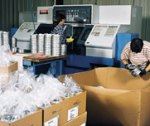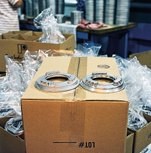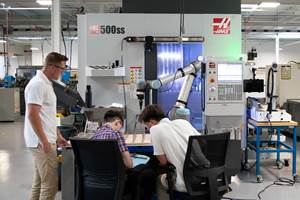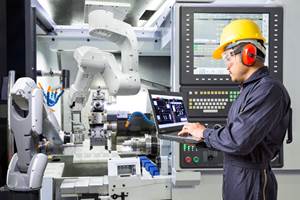Three Steps To Succeed As A Minority Automotive Supplier
When Gary Malloy and Reggie Ball formed Sturgis Machining in February 1998, it was with the intent of becoming a premier minority machine shop to General Motors.
Share





When Gary Malloy and Reggie Ball formed Sturgis Machining (Sturgis, Michigan) in February 1998, it was with the intent of becoming a premier minority machine shop to General Motors. Mr. Malloy knew that three things would be necessary for this to happen: tutelage from the large automaker; certain jobs that are targeted to the company and specific machine tools that are purchased for specific jobs.
The first piece of the puzzle to be completed was the assistance of GM, especially the Powertrain division. "Having General Motors as a mentor is a great way to launch a new company," Mr. Malloy says. Powertrain's Purchasing Department representatives Denny Kross, purchasing manager; Robert Lane, senior buyer; and Nancy Shilling, creativity team leader; expressed interest in helping Mr. Malloy and Mr. Ball establish Sturgis Machining to be a minority supplier that could serve not only the automaker, but Tier One and Two suppliers as well. Early on, Powertrain explained the ground rules for minority participation—"You have to be as good, if not better, than anybody else in the industry. Period."
Indeed, even though it was a new company, it was expected to be a world-class supplier. Only after it demonstrated its manufacturing capabilities would it be allowed to bid on certain Powertrain jobs—and not before.
Powertrain identified three potential jobs that the new company could bid on through a Tier One supplier, Leggett and Platt. The targeted jobs were two transmission clutch housings and a case extension. With this opportunity on the table, Mr. Malloy and Mr. Ball wrote a business plan and identified capital equipment that had machining capabilities far surpassing the job requirements. At GM's urging, Sturgis Machining bid on—and won—those original contracts.
When Mr. Malloy and Mr. Ball were ready to purchase machine tools for their first orders, they wanted to purchase machine tools around the jobs that GM had targeted for them. "We had the luxury of purchasing a specific machine tool for a specific job," says Mr. Malloy. "This is the proper way to manufacture. Too often in the machining business, jobs are made to fit an existing machine, even if they have to be fixtured two or three times, rather than having it fixtured once to maintain the quality."
Their first major equipment purchases were three Mazak (Florence, Kentucky) CNC machine tools. "We purchased a Mazak FH480 horizontal machining center with 25,000-rpm spindles to machine a transmission clutch housing for GM. The high speed spindle gives us the best fit to machine any metal our customers want machined," says Mr. Malloy. "We can go from steel to gray iron without having to change tools—all we have to do is change spindle speeds. In addition, we purchased a 120-toolchanger for quick job changeover. That eliminates the need for an operator to manually load tools for a particular job. Just as importantly, we knew this state-of-the-art machining center would attract other business."
A Mazak Super Quick Turn 18MSY turn/mill center, also one of the three original machine tools purchased, was used to machine a case extension. This was a very difficult part to machine, requiring tight tolerances, including holding a 6-inch diameter to within 0.002 inch. The previous contractor spent two years trying to machine it to specifications. The SQT18MSY, however, achieved P pap (a qualifying 300 piece run just prior to high production quantities) within three weeks, a feat that gained a fair bit of notoriety within GM. Sturgis now machines 300 case extensions daily, a quantity that will leap to 2,000 daily in 2001.
The third machine was a Mazak Dual Turn 20, purchased to machine a GM Powertrain clutch housing. Collectively, the three machine tools were capable of handling all the targeted work Powertrain had to offer. Mazak's Dual Turn 20 is two turning centers in one. It features two facing spindles that can perform simultaneous machining of one part by both left and right spindles, or machining of two sides of one part with an automatic transfer of the part to the other spindle.
Sturgis Machining wanted to send a message to GM Powertrain and other potential customers with the Mazak purchases: that it is committed to providing the best technology and equipment available. Mr. Malloy believed these machines were engineered and built to meet the demands of tough automotive accounts. Machining just three different jobs, however, left Mr. Malloy's three machine tools underutilized and often idle. Mr. Malloy set out to change that.
With Powertrain's help, Mr. Malloy leveraged the Powertrain experience, the Mazak machine tools and previous relationships he and Mr. Ball had with automotive suppliers to attract new business from Tier Ones, such as Borg Warner, Timkin Company and Dana. Mr. Malloy invited representatives from each of these companies to Sturgis Machining to inspect operations, audit the facility, and see the new company's capabilities. Each company liked what it saw and each placed orders. Sturgis was off and running again.
Like Powertrain, these automotive suppliers—such as Tom Hardies, plant manager at Borg Warner's Coldwater facility—tutored, counseled and supported Sturgis Machining to ensure the company would be a successful minority supplier of clutch assemblies. The successfully managed initial jobs for Borg Warner, Timkin Company and Dana led to subsequent contracts. Mr. Malloy's company has handled so many successful jobs in the last two years that it has since become a Tier One supplier to each of them.
As each of these new jobs came in, the versatile Mazaks machined them. As sales increased, it became apparent to Mr. Malloy that additional machine tools would be necessary to handle the increasing load. He decided to go with Mazak again.
Another Mazak Dual Turn 20 was purchased to run steel bearing races for the Timkin Company. A Mazak Dual Turn 250 was purchased to machine a small cylinder housing for Dana. Sturgis also added Mazak's FH 480, FH 4800 and FH 510 horizontal machining centers, capable of performing high speed machining for volume production jobs. In all, the company has acquired 13 Mazak machine tools.
Collectively, these machines provide Sturgis Machining the advantage of flexibility. Mr. Malloy explains that the automotive industry is coming out with new engines and transmissions at a faster rate than ever before. Even if an engine remains in production for a decade, undoubtedly there will be engine variations, and suppliers must have the flexibility to run those variations and/or make engineering performance changes. Transfer lines cannot do that. Consequently, the trend is toward flexible CNC machine tools that can be easily reprogrammed.
Sturgis Machining has greatly increased its sales. GM Powertrain recently awarded Sturgis Machining Tier One status—and with it six additional programs. Mr. Malloy recognizes, however, that none of the company's opportunities would be possible had not GM Powertrain's management helped tutor the upstart company and target them with certain jobs, and had he not purchased the best machine tools for the long haul.
Related Content
CNC Machine Shop Honored for Automation, Machine Monitoring
From cobots to machine monitoring, this Top Shop honoree shows that machining technology is about more than the machine tool.
Read More6 Machine Shop Essentials to Stay Competitive
If you want to streamline production and be competitive in the industry, you will need far more than a standard three-axis CNC mill or two-axis CNC lathe and a few measuring tools.
Read MoreOrthopedic Event Discusses Manufacturing Strategies
At the seminar, representatives from multiple companies discussed strategies for making orthopedic devices accurately and efficiently.
Read MoreHow to Determine the Currently Active Work Offset Number
Determining the currently active work offset number is practical when the program zero point is changing between workpieces in a production run.
Read MoreRead Next
Registration Now Open for the Precision Machining Technology Show (PMTS) 2025
The precision machining industry’s premier event returns to Cleveland, OH, April 1-3.
Read More5 Rules of Thumb for Buying CNC Machine Tools
Use these tips to carefully plan your machine tool purchases and to avoid regretting your decision later.
Read MoreSetting Up the Building Blocks for a Digital Factory
Woodward Inc. spent over a year developing an API to connect machines to its digital factory. Caron Engineering’s MiConnect has cut most of this process while also granting the shop greater access to machine information.
Read More































